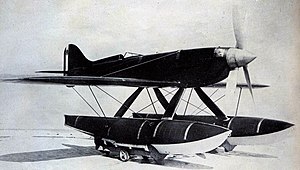Macchi M.C.72
| M.C.72 | |
|---|---|
 |
|
| A M.C.72 on the ground | |
| Role | Seaplane racing aircraft |
| Manufacturer | Aeronautica Macchi |
| Designer | Mario Castoldi |
| First flight | July 1931 |
| Retired | 23 October 1934 (last flight) |
| Primary user | Kingdom of Italy |
| Number built | 5 |
The Macchi M.C. 72 was an experimental seaplane designed and built by the Italian aircraft company Macchi Aeronautica. The M.C. 72 held the world speed record for all aircraft for five years. In 1933 and 1934, it set a world speed record·for piston engine-powered seaplanes which still stands.
The Macchi M.C. 72 was one of a series of seaplanes developed by Macchi Aeronautica. An earlier model, the M.24 was a twin-engine flying boat armed with machine guns and capable of carrying a torpedo. Later in the 1920s, Macchi focused on speed and on winning the Schneider Trophy. In 1922, the company hired aircraft designer Mario Castoldi to design high-speed aircraft.
In 1926, the company won the trophy with the M.39 which attained a top speed of 396 km/h (246 mph). Further aircraft, the M.52, M.52R and the M.67, were designed and built but victory in the Schneider races kept eluding the Italians. Castoldi then designed the ultimate racing seaplane, the M.C. 72, a single-seater aircraft with two floats.
The M.C. 72 design was unique with a fuselage partly metal to the cockpit and wood monocoque bolted to the front tubular portion by four bolts. The streamlined nose contours enclosed an oil tank with its outside wall exposed to the airstream. The wing was all metal with flat tubular water radiators smoothly faired into the wings. The twin pontoons had three smoothly-faired radiators on the outer surfaces, the forward radiator for water and the centre and rear radiators for oil cooling. The float struts also featured water radiators and another radiator was fitted during hot conditions under the fuselage running from cockpit to tail.
The M.C. 72 was built in 1931 with the idea of competing for what turned out to be the final Schneider Trophy race, but due to engine problems, the M.C. 72 was unable to compete.
Instead of halting development, Macchi continued work on the M.C. 72. Benito Mussolini personally took an interest in seeing development of the M.C. 72 continue and directed state funds to the company.
...
Wikipedia
